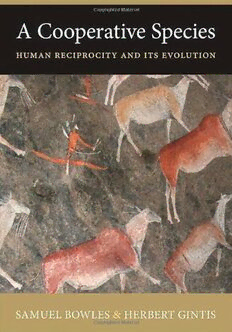Download A Cooperative Species: Human Reciprocity and Its Evolution PDF Free - Full Version
Download A Cooperative Species: Human Reciprocity and Its Evolution by Samuel Bowles, Herbert Gintis in PDF format completely FREE. No registration required, no payment needed. Get instant access to this valuable resource on PDFdrive.to!
About A Cooperative Species: Human Reciprocity and Its Evolution
Why do humans, uniquely among animals, cooperate in large numbers to advance projects for the common good? Contrary to the conventional wisdom in biology and economics, this generous and civic-minded behavior is widespread and cannot be explained simply by far-sighted self-interest or a desire to help close genealogical kin.In A Cooperative Species, Samuel Bowles and Herbert Gintis--pioneers in the new experimental and evolutionary science of human behavior--show that the central issue is not why selfish people act generously, but instead how genetic and cultural evolution has produced a species in which substantial numbers make sacrifices to uphold ethical norms and to help even total strangers.The authors describe how, for thousands of generations, cooperation with fellow group members has been essential to survival. Groups that created institutions to protect the civic-minded from exploitation by the selfish flourished and prevailed in conflicts with less cooperative groups. Key to this process was the evolution of social emotions such as shame and guilt, and our capacity to internalize social norms so that acting ethically became a personal goal rather than simply a prudent way to avoid punishment.Using experimental, archaeological, genetic, and ethnographic data to calibrate models of the coevolution of genes and culture as well as prehistoric warfare and other forms of group competition, A Cooperative Species provides a compelling and novel account of how humans came to be moral and cooperative.
Detailed Information
| Author: | Samuel Bowles, Herbert Gintis |
|---|---|
| Publication Year: | 2011 |
| ISBN: | 9780691151250 |
| Pages: | 275 |
| Language: | English |
| File Size: | 4.234 |
| Format: | |
| Price: | FREE |
Safe & Secure Download - No registration required
Why Choose PDFdrive for Your Free A Cooperative Species: Human Reciprocity and Its Evolution Download?
- 100% Free: No hidden fees or subscriptions required for one book every day.
- No Registration: Immediate access is available without creating accounts for one book every day.
- Safe and Secure: Clean downloads without malware or viruses
- Multiple Formats: PDF, MOBI, Mpub,... optimized for all devices
- Educational Resource: Supporting knowledge sharing and learning
Frequently Asked Questions
Is it really free to download A Cooperative Species: Human Reciprocity and Its Evolution PDF?
Yes, on https://PDFdrive.to you can download A Cooperative Species: Human Reciprocity and Its Evolution by Samuel Bowles, Herbert Gintis completely free. We don't require any payment, subscription, or registration to access this PDF file. For 3 books every day.
How can I read A Cooperative Species: Human Reciprocity and Its Evolution on my mobile device?
After downloading A Cooperative Species: Human Reciprocity and Its Evolution PDF, you can open it with any PDF reader app on your phone or tablet. We recommend using Adobe Acrobat Reader, Apple Books, or Google Play Books for the best reading experience.
Is this the full version of A Cooperative Species: Human Reciprocity and Its Evolution?
Yes, this is the complete PDF version of A Cooperative Species: Human Reciprocity and Its Evolution by Samuel Bowles, Herbert Gintis. You will be able to read the entire content as in the printed version without missing any pages.
Is it legal to download A Cooperative Species: Human Reciprocity and Its Evolution PDF for free?
https://PDFdrive.to provides links to free educational resources available online. We do not store any files on our servers. Please be aware of copyright laws in your country before downloading.
The materials shared are intended for research, educational, and personal use in accordance with fair use principles.

